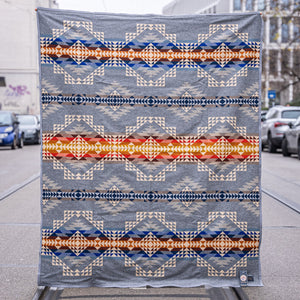
Pendleton Blanket – Smith Rock
Prices include VAT
Excl. Shipping Cost
Ready for shipment within 1-3 business days.
Only 2 in stock
Pendleton's Smith Rock blanket comes in robe size, the size preferred by Native Americans for ceremonial purposes and wrapping about oneself as a robe. They are impressive as wall hangings and practical when folded on a sofa or at the foot of a bed.
- Pendleton Blanket Robe
- Smith Rock
- Dimensions: 203cm x 163cm
- 82% Pure Virgin Wool, 18% Cotton Jacquard
- Unnapped (Uncombed Fabric For Sharper Pattern Definition)
- Felt Bound
- Ultrasuede Trim
- Dry Clean
- Made in USA
Smith Rock:
This banket design echoes the towering rock face, geometric peaks, deep water canyons and hiking trails of Smith Rock State Park in Central Oregon—considered by many to be the birthplace of American sport climbing.
FAQ's
FAQ about Pendleton
Can Pendleton Wool blankets be washed?
Pendleton blankets are made from 82% pure virgin wool and 18% cotton. As a result, they require the utmost care when washing. The recommended cleaning method for a Pendleton
blanket is dry cleaning. (This way, you take the safest route and ensure your product remains in great condition.)
Where does Pendleton Wool come from?
Pendleton Wool traces its origins back to the 1860s. At that time, Thomas Kay had the vision to produce his own wool from his own sheep. His quest for suitable land to realize his
idea led him to a new state in America, Oregon. There, he established the family-run
business that still exists today and eventually passed it on to his daughter.
In 1909, Pendleton Woolen Mills was founded. The company's headquarters are
still located in Portland, Oregon.
Why are Pendleton blankets so expensive?
Pendleton Woolen Mills is the only company officially authorized to work with the original spiritual patterns of Native Americans. Unlike many other major fashion brands that produce patterns based on trends and seasons, Pendleton has a historical authority for Native American prints. For instance, Pendleton maintains relationships with the Navajo, Hopi, and Zuni tribes. Some of the proceeds from the sale of their blankets also go back to these communities.
The blankets are exclusively manufactured in the United States, specifically in just two remaining woolen mills. They are produced on Jacquard looms. Since 1995, Pendleton has been supporting the work of the American Indian College Fund through the sale of their blankets. As of 2023, Pendleton has provided over $1.7 million in scholarships for Native American and Alaskan students studying at tribal colleges and universities (TCUs).
The majority of the wool for Pendleton blankets still comes directly from the United States today. Only the finest and best-quality wool is used in their production. Pendleton
collaborates closely with sheep farmers from whom they source the wool for their products. While Pendleton does purchase wool from around the world, the majority of the wool still originates from the USA. Diversity, quality, and quantity of wool fibers are crucial for creating fine Pendleton woolen goods.
This pure wool is then processed and turned into fabrics. However, the fabric manufacturing process involves several steps, including dyeing, carding, spinning, weaving, and finishing. Before the fabrics are considered complete, they go through additional stages such as washing, shearing, pressing, napping, and inspection.


